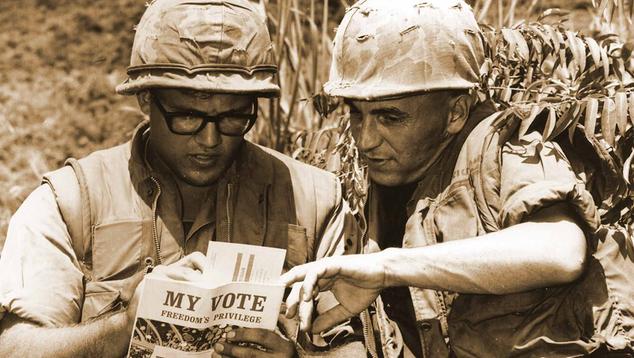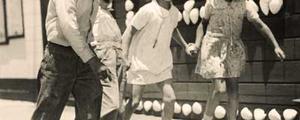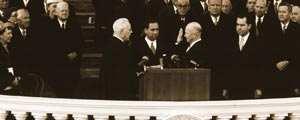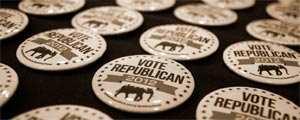Fifty years ago, on July 1, 1971, the 26th Amendment took effect, lowering the voting age for all elections to 18. The change was decades in the making, with Gallup first asking about it in 1939 and a majority of Americans consistently supporting it by the 1950s.

Line graph. Trend from 1939 to 1970 in Americans' support for lowering U.S. voting age to 18. Percentage supporting was 17% in 1939, and rose to 39% in 1942 and as high as 63% by 1953. Thereafter, support ranged from 51% to 66%, including 57% in 1970.
Gallup's 1939 reading on public support for reducing the voting age found 17% of Americans favoring it and 79% opposed. But the proposal gained momentum after eligibility for the military draft was lowered from age 21 to 18 in November 1942, about a year into World War II. That gave rise to the slogan, "Old enough to fight, old enough to vote."
When Gallup asked about lowering the voting age in 1942 (after President Franklin D. Roosevelt had proposed lowering the draft to 18, but before Congress passed it), 39% were in favor of lowering the voting age, with a bare majority (52%) opposed. As George Gallup noted in his 1943 report, "On this issue, as on so many others, the war has begun to change people's thinking."
President Dwight D. Eisenhower, former Supreme Commander of Allied forces in Europe, endorsed the change in his 1954 State of the Union address, saying, "For years our citizens between the ages of 18 and 21 have, in time of peril, been summoned to fight for America. They should participate in the political process that produces this fateful summons." But by then, support had already surged to 63% (in May 1953), perhaps related to the Korean War that was nearing its end.
In December 1970, the U.S. Supreme Court ruled that the voting age be lowered to 18 for federal elections, and several states had already done the same. But a constitutional amendment would be required to extend the requirement to all state and local elections.
It took rising pressure stemming from young Americans' participation in the Vietnam War for Congress to ultimately act, passing the 26th Amendment on March 23, 1971. The amendment was sent to the state legislatures for ratification, and this occurred with record speed, approved by the requisite three-fourths of the states by June. The amendment took effect July 1, and President Richard Nixon formally signed it on July 5.
Major Age Gaps in Support for Expanding the Vote
Gallup's final poll on the matter was taken March 11-14, 1971, asking Americans if they favored or opposed lowering the voting age for local and state elections. Sixty percent favored it, while just over a third were opposed.
In George Gallup's report on the survey, he noted that lowering the voting age "could cause serious problems for the GOP," explaining that "Recent surveys show the Democratic Party holding marked advantages among this age group in terms of political party allegiance, attitudes toward the war and the Nixon administration, and support for Democrats in trial heats against President Nixon."
Public support for lowering the voting age in local and state elections did vary somewhat by partisanship, with 63% of Democrats versus 50% of Republicans in favor. But the percentage backing the change varied even more by age, ranging from 84% of those 18 to 20 -- the age group benefiting from the amendment -- and 73% of those 21 to 29, versus 57% of adults 30 to 49 and 52% of those 50 and older.
| Favor | Oppose | No opinion | |
|---|---|---|---|
| % | % | % | |
| U.S. adults | 60 | 35 | 5 |
| Age | |||
| 18 to 20 | 84 | 14 | 2 |
| 21 to 29 | 73 | 21 | 6 |
| 30 to 49 | 57 | 38 | 5 |
| 50 and older | 52 | 41 | 7 |
| Party ID | |||
| Republicans | 50 | 44 | 6 |
| Independents | 64 | 32 | 4 |
| Democrats | 63 | 32 | 5 |
| Region | |||
| East | 62 | 31 | 7 |
| Midwest | 54 | 41 | 5 |
| South | 65 | 31 | 4 |
| West | 57 | 38 | 5 |
| Gallup, March 11-14, 1971 | |||
"Voting Absentee, Vietnam, 1968" by Archives Branch, USMC History Division is licensed under CC BY 2.0.
View the 1971 Gallup news release on lowering the voting age to 18.
Read more from the Gallup Vault.




